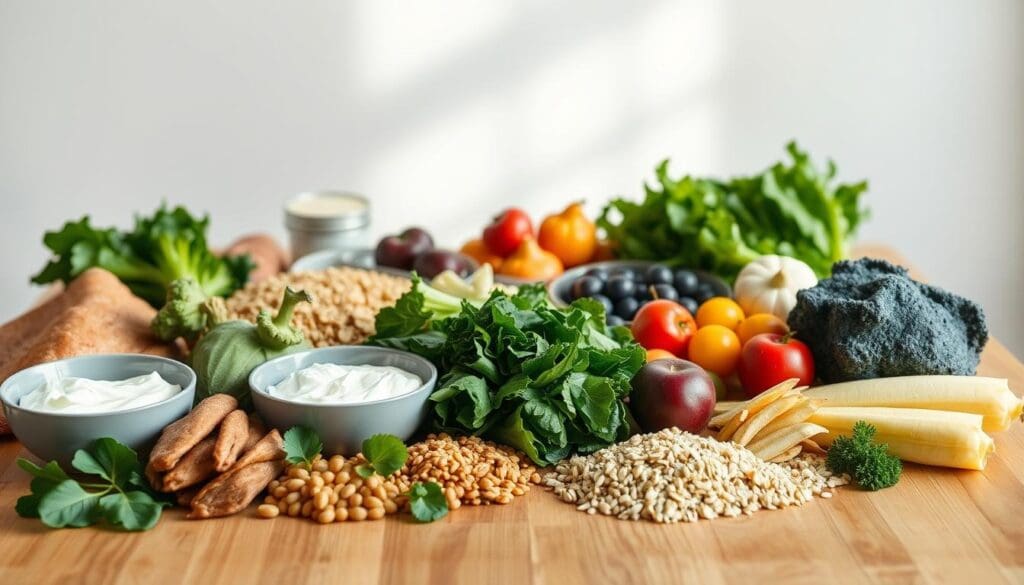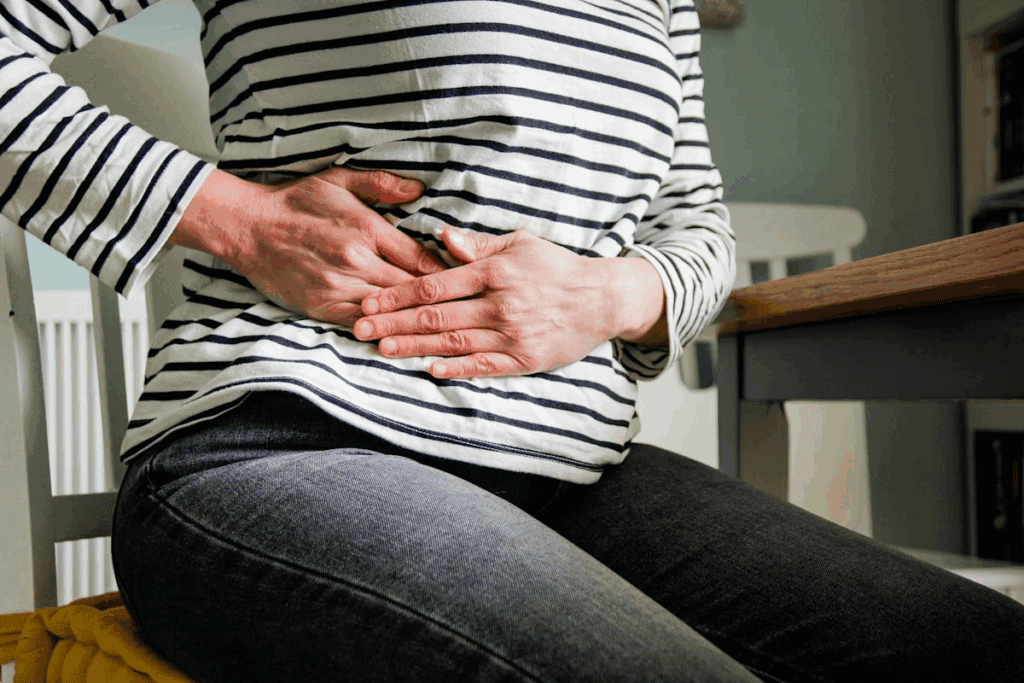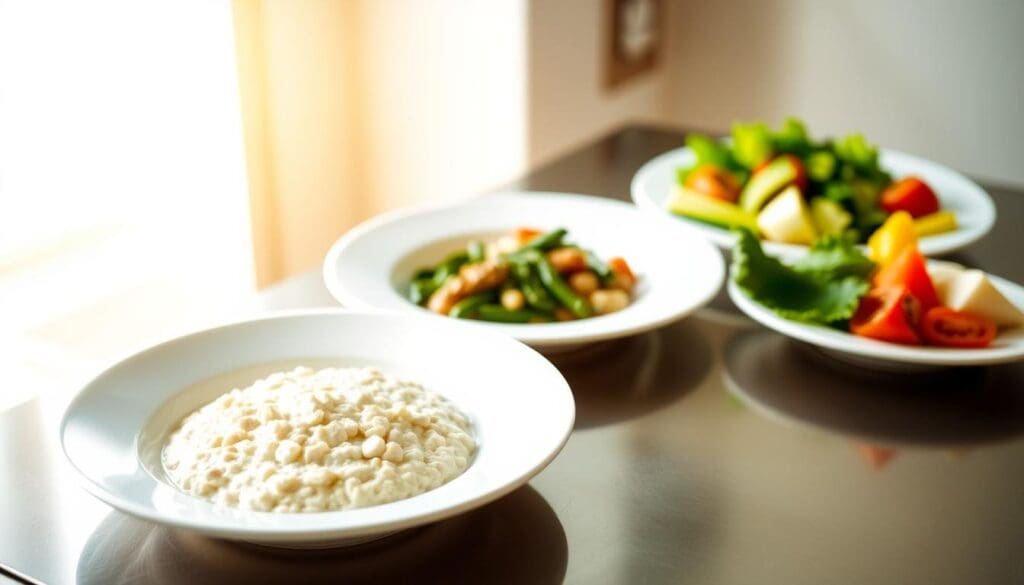Last Updated on November 26, 2025 by Bilal Hasdemir

Foods to eat after colon resection surgery, it’s key to eat foods that help you heal. You’ll start with clear liquids and then move to nutrient-rich foods.
A good diet is important for getting better. It helps your body fix itself and get strong again. It’s important to choose easy-to-digest foods to avoid discomfort and keep you healthy.

Colon resection surgery changes how your body digests food. It removes part of the colon, affecting nutrient absorption. Choosing the right foods after surgery is key.
After surgery, your digestive system needs time to heal. Removing part of the colon can alter bowel movements and nutrient absorption. Knowing these changes helps manage your diet.
Temporary issues like diarrhea or constipation may occur. These happen because the colon is adjusting. A good diet can help manage these symptoms and aid healing.
Nutrition is vital for recovery after colon resection surgery. It helps the body heal, fight off infections, and regain strength.
A balanced diet should include proteins, carbohydrates, and fats. Proteins are key for repairing tissues and boosting immunity. Include lean meats, fish, eggs, and dairy in your diet.
| Nutrient | Role in Recovery | Food Sources |
| Protein | Repairs tissues, maintains immune function | Lean meats, fish, eggs, dairy |
| Carbohydrates | Provides energy | Whole grains, fruits, vegetables |
| Healthy Fats | Supports overall health, aids in absorption of vitamins | Nuts, seeds, avocados, olive oil |
Choosing the right foods after colon resection surgery is important. Focus on nutrient-rich foods and avoid irritants. This helps your body heal and get back to health.

Knowing the stages of the post-colon resection diet is key for patients to recover well. The diet starts with easy-to-digest foods and then adds more nutrition. This helps the body heal.
The first stage after surgery is a clear liquid diet. It’s important to let the digestive system rest and heal. Clear liquids like water, clear broths, and electrolyte-rich drinks are okay. But, avoid any colored or pulpy liquids.
Next, the diet includes thicker, more calorie-rich liquids. This stage adds strained soups, fruit juices without pulp, and nutritional supplements. It aims to increase calories and protein without stressing the digestive system.
After a few days, patients can start eating soft foods. This stage introduces more texture and nutrients. Foods like mashed potatoes, scrambled eggs, and pureed vegetables are good choices. Remember to chew well and eat slowly.
By the third week, patients can start eating a regular diet. But, they should avoid high-fiber, spicy, and uncomfortable foods. Slowly adding different foods ensures a balanced diet. Always watch how your body reacts to new foods and adjust your diet as needed.
In summary, the post-colon resection diet stages help the body heal by adding more food gradually. By following these stages, patients can have a smoother recovery.
Eating the right foods after colon resection surgery is key for a quick and easy recovery. It’s important to eat foods that are easy to digest. This helps your body get the nutrients it needs to heal.
Clear broths are great for the first few days after surgery. They are easy to digest and full of fluids and electrolytes. Clear chicken or vegetable broth helps keep you hydrated and aids in healing.
Strained fruit juices, like apple or grape juice, are good choices. They are gentle on your stomach. Avoid juices with pulp as they can irritate. These juices give you the vitamins and sugars you need for energy.
Smooth pureed soups, such as tomato or vegetable soup, are gentle on your stomach. Make sure they are well blended to avoid any lumps. These soups are a nutritious part of your diet.
Gelatin and popsicles can be soothing during recovery. They help keep you hydrated and are easier on your stomach than solid foods. Choose flavorful gelatin or popsicles made from clear broths or juices to add variety to your diet.
In summary, during the initial recovery phase after colon resection, focus on clear liquids and easy-to-digest foods. These include clear broths, strained fruit juices, smooth pureed soups, and gelatin or popsicles. These foods support your recovery by providing necessary nutrients and reducing digestive discomfort.
Protein-rich foods are key for healing after colon resection. They help fix tissues and reduce recovery risks. A diet rich in protein aids in wound healing and supports overall recovery.
A balanced diet with high-protein foods helps patients regain strength. Here are some recommended foods after colon resection surgery:
Plain Greek yogurt is packed with protein and easy to digest. It’s great for recovery. It also has probiotics that help with gut health after surgery.
Tender baked fish, like cod or tilapia, is a good protein source. It’s low in fat and easy on the stomach. It provides important nutrients for healing.
Scrambled eggs are a versatile protein source. They’re easy to digest and rich in amino acids. You can make them in many ways to suit your taste.
Tofu and other plant-based proteins are great for vegetarians or vegans. They’re high in protein and can be cooked in many ways. They help keep your diet balanced during recovery.
| Protein Source | Protein Content per Serving | Ease of Digestion |
| Plain Greek Yogurt | 20 grams per 6 oz serving | Easy |
| Tender Baked Fish | 30 grams per 3 oz serving | Moderate |
| Scrambled Eggs | 18 grams per 2 large eggs | Easy |
| Tofu | 20 grams per 3 oz serving | Moderate |
A study on nutrition after surgery found that “adequate protein intake is key for wound healing and lowering post-operative risks.”
Adding these protein-rich foods to your diet after colon resection surgery can greatly aid in healing and recovery.
Gentle carbohydrates are key for refilling energy after colon resection. They are easy to digest, which helps the digestive system heal.
Some of the most beneficial gentle carbohydrates include:
White rice is a top choice for post-colon resection diets. It’s bland and easy to digest. Rice porridge, or congee, is another comforting option. It gives needed carbs without hurting the digestive system.
Refined pasta is a gentle carb for post-surgery diets. Paired with a light sauce, it offers a comforting, energy-rich meal without discomfort.
Oatmeal and Cream of Wheat are warm, comforting choices. They’re gentle on the digestive system. Rich in carbs, they can be made tastier with fruits or honey without upsetting the stomach.
Adding these gentle carbs to your diet can help a lot in getting your energy back after colon resection surgery.
Choosing the right fruits and vegetables is key for digestive health after colon surgery. It’s important to pick foods that are easy on the stomach but also give you the nutrients you need.
Ripe bananas are easy to digest and full of potassium. This mineral is lost after surgery. They’re also soft on your stomach, perfect for the early recovery days.
Applesauce is a digestive-friendly choice. It’s made from cooked apples, which are easier to digest than raw ones. It has some fiber, helping keep your gut healthy.
Well-cooked carrots and squash are rich in nutrients and gentle on your stomach. Cooking them softens their fibers, reducing discomfort. They’re also packed with vitamins and minerals that aid in healing.
Avocados are rich in healthy fats and fiber, great for your digestive system. They’re also flexible, fitting into many dishes. You can add them to smoothies or salads once you’re past the initial recovery.
Adding these fruits and vegetables to your diet can greatly help your digestive health after colon surgery. Start with small amounts and watch how your body reacts to new foods.
After colon surgery, what you eat is very important for your recovery. Some foods can make you uncomfortable or slow down healing. Knowing which foods to avoid is key during the first few weeks.
High-fiber foods are good for you later on. But, they can be hard on your stomach right after surgery. Foods like raw vegetables, beans, and whole grains might make you feel bloated or uncomfortable. It’s best to cut down on these foods for a bit.
Some fats and oils can be tough on your stomach after surgery. Greasy or fried foods are hard to digest and might make you feel sick. Stick to lighter, easier foods while you’re recovering.
Spicy or highly seasoned foods can upset your stomach. It’s wise to skip spicy dishes, citrus fruits, and tomatoes until your stomach is back to normal.
Some foods make gas, which can be a problem after surgery. Foods like broccoli, cabbage, and beans can make you feel bloated. Cutting back on these foods can help you feel better.
By avoiding these foods in the first few weeks, you can feel more comfortable and help your body heal faster after colon surgery.
Long-term diets are key to keeping the colon healthy after surgery. A good diet helps with recovery and keeps you well. It’s important to eat a balanced diet that supports your colon’s health.
It’s important to slowly add fiber back into your diet after surgery. Start with a low-fiber diet to ease digestion. Then, add foods like whole grains, fruits, and veggies. This helps your colon adjust and aids digestion.
“The key is to increase fiber intake slowly to avoid discomfort or complications.” Start small and watch how your body reacts. Adjust your diet as needed.
A balanced diet is essential for colon health. Make sure your diet has lean proteins, whole grains, and lots of colorful fruits and veggies. This mix supports your health and prevents digestive problems.
Drinking enough water is vital for digestion and health. Water helps your body use nutrients and fiber better. It also helps prevent constipation by making stool softer and bowel movements regular.
“Drinking enough water is essential for maintaining a healthy digestive system.”
Try to drink at least eight glasses of water a day. Adjust this based on how active you are and where you live.
Creating a personalized meal plan after colon surgery is key for a smooth recovery. It helps support healing and keeps the colon healthy in the long run. Understanding the different stages of diet after surgery is important.
A good meal plan starts with clear liquids and then moves to solid foods slowly. This helps the digestive system adjust without getting overwhelmed. Foods high in protein, gentle carbs, and easy-to-digest fruits and veggies are best for recovery.
To make a meal plan that fits you, talk to a healthcare provider or a registered dietitian. They can give you advice that’s right for your needs and health. This personalized approach can make your recovery better and improve your overall health.
Start with clear liquids like chicken or vegetable broth. Also, try strained fruit juices and gelatin. As you get better, move to soft foods like pureed soups and tender fish.
It usually takes about week 3 to start eating regular foods again. But, this can change based on how well you recover.
Good protein sources include Greek yogurt, baked fish, scrambled eggs, and tofu. These foods help with healing and are easy on your stomach.
Yes, you can eat some fruits and veggies after surgery. Try ripe bananas, applesauce, and cooked carrots and squash. Avocados are also good because they’re easy to digest.
Avoid foods high in fiber, fats, and oils that can irritate your stomach. Also, steer clear of spicy and gas-producing foods. They can be hard to digest and cause discomfort.
Drinking plenty of fluids is key to healing and staying healthy after surgery. Make sure to drink water, clear broths, and electrolyte-rich drinks.
Fiber is important, but eat less of it at first. As you get better, you can add more fiber-rich foods to your diet. This helps keep your colon healthy.
Think about what you need to eat, any dietary limits, and how you’re feeling. Talk to a healthcare professional or dietitian to make a meal plan just for you.
Good carbs include white rice, rice porridge, and refined pasta. Also, try oatmeal and cream of wheat. These foods are easy to digest and help you regain energy.
Yes, eat a balanced diet, add fiber slowly, and stay hydrated. A healthy diet helps your colon stay healthy and reduces the risk of problems.
Dahmiwal, T., et al. (2024). Dietary considerations in cholecystectomy. Journal of Gastrointestinal Surgery, 28(5), 345-350. Retrieved from https://pmc.ncbi.nlm.nih.gov/articles/PMC11200314
Subscribe to our e-newsletter to stay informed about the latest innovations in the world of health and exclusive offers!